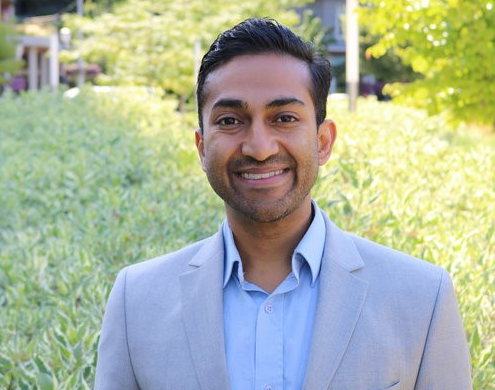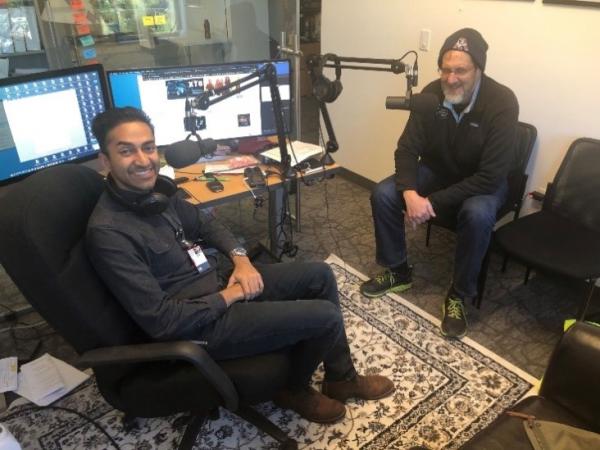Evidence and policy to ensure good clinical practice

Interview with Vinay Prasad MD MPH by Heiko Becker MD, on behalf of YoungEHA
Leaders in the field that have the potential to make a difference, that challenge the way we are doing things, who push our perspective out of our comfort zone, can help us learn. Such a person is Dr Vinay Prasad (@VPrasadMDMPH), a hematologist-oncologist and Associate Professor of Medicine at Oregon Health and Science University. He studies cancer drugs, health policy, and evidence-based medicine (EBM). He has authored over 200 academic articles, co-authored the book “Ending Medical Reversal”, and written the upcoming book “Malignant”. He is well known for his views on health policy and strong opinions that often ignite intriguing discussions. When we approached him for this interview, we were hoping for an engaging and stimulating conversation – and we were not disappointed.
HB: You recently co-authored a book called “Ending Medical Reversal”. Can you explain Medical Reversal? What was your motivation to get engaged in this topic?
VP: I have been working on the topic of Medical Reversal with Dr. Adam Cifu, University of Chicago, for just over a decade. Back then, we were interested in medical practices that were widely used for years—even decades—and later found to offer no net benefit. I want to be clear. These were not practices that were marginal and replaced by better ones; they were practices that were not better than a prior or lesser standard of care. In many cases, they were no better than doing nothing. About a decade ago, there were a number of high profile reversals that sparked our interest, such as hormone replacement therapy for post-menopausal women, autologous transplant for breast cancer, and even stenting for chronic stable angina.
HB: You have published on many other topics, especially on clinical trial design (e.g. surrogate endpoints), but also on whether past publications of early career MDs predict future publications. What do the topics you are interested in have in common? Is there a topic that is especially close to your heart?
VP: The uniting theme of all my work is using the scientific method/clear thinking to reach accurate conclusions about medical practices and policies. That is true for my work on cost of drugs, cancer therapies, reversed practices, and even some early work on medical education. The general method I employ is meta-research and epidemiology, and I consider mentors to be John Ioannidis, Rita Redberg, and Tito Fojo, among others. I care about the capital T, Truth, and that is what I am chasing.
I care about the capital T, Truth, and that is what I am chasing.
HB: Tell us about your training – how did you become who you are? Were there distinct moments, people or programs that shaped your professional career?
VP: In the first two years of medical school, I was allergic to the massive, tedious, and, in retrospect, pointless memorization. Yet, I was sustained by the idea of being a community doctor. I imagined specializing and practicing. A few things changed my thinking and pushed me to the Academy. First, Adam Cifu and the other evidence-based medicine proponents at University of Chicago infected me with that mindset, and then they sent me off to residency. Second, in residency and beyond, having seen the light of EBM, I was concerned with practices that appeared to run counter to the best evidence. Eventually, these became so irksome that I decided to write some articles about them. This led to more articles, many with Adam Cifu. Then, suddenly, at some point, one has written enough articles that one’s career takes on a life of its own. I figured I would give policy research a try, and if it didn’t work out, I would shift into private practice. I still think that, now five years into faculty.
I think it is worth saying explicitly that there are few hematologist-oncologists who do health policy research. Most cancer policy researchers are not oncologists, and most policy researchers do not focus on cancer. Most oncologists are trialists or laboratory researchers. I continue to think the path I am on is not well trod, and is uncertain. Even five years into it, I don’t know if I can do it forever. Funding and peer reviewers can be misguided and unforgiving. I will do this as long as is possible.
I continue to think the path I am on is not well trod, and is uncertain.
HB: What does a normal day or week look like for you? How do you manage all your different activities?
VP: I attend on inpatient hematology or oncology services one month or two a year, and those weeks are atypical and super busy. I also travel more than I want to, and those trips are also atypical and busy. I teach a class in January on appraising medical literature, and that month is awfully busy. Instead of these times, let me describe a typical week where I am not travelling, not teaching and not on service.

Vinay Prasad interviewing Gil Welch for his podcast 'Plenary session'
I get to work around 9 AM. I commute about 60 miles a week on bicycle year round, wearing a waterproof outfit, and shower at work and keep several suits there. On Monday, I work on notes, emails, papers, and start tweeting anytime I start to feel stressed out or bored. In other words, I tweet a fair bit on Mondays. In the afternoon, I complete the weeks’ Plenary Session podcast—which is on the iTunes store, Spotify, etc.—and send it off to the producer Quiana Klossner, who works magic and posts it later in the week. Making the podcast has been fun.
On Tuesdays, I might meet with students I am supervising on projects they have; have some phone calls with collaborators; get lunch with one or two of the Heme-Onc fellows who like me; and I might give a lecture in the afternoon to someone’s class on evidence based medicine. Again, when I am bored or between activities, I tweet. I am probably also returning pages throughout the day and working on a paper.
On Wednesdays, I am in clinic. My clinic is now several tumor types—both malignant hematology and solid tumor—and it takes up the entire day. When I am in clinic, I don’t think about other things besides clinic. It is a joy to be someone’s doctor and I enjoy Wednesdays. Rarely, a Heme-Onc fellow, medical student or resident comes to my clinic, and then I am very happy.
On Thursdays, I go to work with dread. I know that this is the last day I will have to catch up on the mountain of paperwork and emails that I have for the week. I am confident that it is not humanly possible to do it all. This heightens my anxiety. I prioritize patient care and patient notes, and make sure those get done. Then I prioritize the trainees who have chosen to work with me. Lastly, I try to catch up on journal requests (i.e. proofs, revisions), and after that I try to respond to all emails. I am sure I miss responding to emails and I fear people think I am ignoring them. But c'est la vie.
On Friday mornings, I might give the Fellows a lecture on cancer drugs, or host our seminar series called “FDA drug approvals”. That is where the fellows present the new FDA drug approvals. They go through the mechanism of action, efficacy data, and finally say whether they would have approved the drug. I learned this from Tito Fojo, who did this as my fellowship program director. I enjoy arguing with the fellows, and hopefully they see it as good-natured and educational. Then, I am off to my second clinic on Friday. In the middle of the day, we break for tumor board. I enjoy interacting with the surgery and radiation oncology teams. In the afternoon, I bike home. If the week is stressful, I take a detour and bike up a punishing hill…twice. Then I head home.
On the weekends, I don’t do work, but I don’t consider twitter work, and others may disagree.
HB: You are very active on Twitter. Why is that? What are the advantages in comparison with older media? What are potential drawbacks?
VP: We have such a short time in this life to do something that counts. I did not envision that health policy would be my lot in life, but it is. As such, I have so little time to try to make the abject mess of US health policy better—and by better I mean better for average Americans and not corporations or shareholders. Twitter is a tool, just like peer review papers, or podcasts or op-eds. All of these are done with the goal of educating, learning, researching, thinking about how to make health policy better, and how to persuade the people who can enact change in the face of entrenched interests and stubborn opposition. I will use every tool at my disposal during the brief time I have to work on the topic. When that time is over, I will vanish.
We swore an oath to do our very best for the people we care for
HB: What words of wisdom do you have for your younger self with regard to your professional career and life?
VP: I don’t know what I would tell myself, but I do know what I would tell others who are heading to be hematologists or oncologists or both. Here is what I would say: We swore an oath to do our very best for the people we care for, but we are failing. Our drugs cost too much, deliver too little, are hyped and promoted by conflicted leaders. Critical thinkers are an endangered species among our ranks, and conflicted Key Opinion Leaders (KOLs) are a dime a dozen. Our practices are bankrupting society and impoverishing social programs and safety nets. Our evidence base has been hijacked by for-profit entities. We have to do better. We have to fix this. And it will only be the brave, young, junior folks who fix it. It will never be the satisfied, complacent, entrenched interests. To the junior folks, I would say: you have to become better at reading papers and understanding statistics. You have to advocate for policies that help the average citizen of your nation and the world. You have to resist the siren call of Pharma and the sweet mutterings of conflicted KOLs. Forget being a trialist. Forget running a translational lab. Instead study policy. Understand how our prescribing and practice fits in the broader society. Push for reform. We are in the midst of a professional crisis. If we do not repair it ourselves, we will have failed ourselves, our patients and our oath.
We are grateful to Dr Vinay Prasad for this inspiring interview and his refreshing insights into how he manages a busy schedule and life, and follows his standards and ideals. If you want to follow his advice and are interested in policy, be sure to read HemAffairs, the EHA policy newsletter and attend the EHA-Patient Joint Symposium during the EHA Annual Congress. If you want to get actively involved with policy matters, please contact us at YoungEHA@ehaweb.org.



 Back
Back